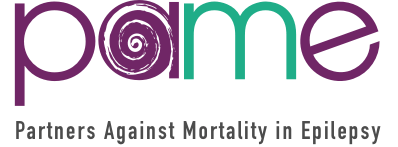6th PAME Conference
The PAME Conference will be held at the Hilton Nashville Downtown, 121 South 4th Avenue, Nashville, TN 37201.
Check out the Program Book
Wednesday, November 30, 2022
2:00 pm |
Registration opens |
2:30 pm |
Welcome session for families and advocates1. Welcome remarks, Tom Stanton, Danny Did Foundation and Alison Kukla, Epilepsy Foundation 2. Navigating Traumatic Grief, Gina Frieden, Vanderbilt University and Gardiner Lapham, Band Foundation 3. Group Discussion: Coping with Grief by Incorporating Wellness, led by Maureen Slotnick, Danny Did Foundation Ambassador and Alison Kukla, Epilepsy Foundation 4. Panel discussion: turning grief into action
moderated by Tom Stanton, Danny Did Foundation |
5:30 pm |
Adjourn |
6:00 pm |
Welcome reception (open to all conference attendees) |
Thursday, December 1, 2022
7:30 am |
Registration opens (Continental breakfast available) |
8:00 – 8:30 am |
Welcome |
8:30-10:00 am |
Global Epilepsy Mortality – The Public Health Burden and International InitiativesThe risk of premature death in people with epilepsy is up to three times higher than in the general population. In low- and middle-income countries the risk of preventable morality may be even higher due to challenges with access to treatment and the stigma of epilepsy. How do we better understand global trends and regional differences in mortality, raise awareness of the problem and scale successful interventions? This session will shine a light on a range of efforts at national and international levels. Moderator: Elizabeth Donner, MD, MSc, FRCPC, The Hospital for Sick Children Toronto Faculty:
Panel discussion
|
10:00-10:30 am |
Break |
10:30am-12:00pm |
Blurred distinctions between SIDS, SUDC and SUDEPWhat do sudden infant death syndrome (SIDS), sudden unexplained death in childhood (SUDC), and sudden unexpected death in epilepsy (SUDEP) have in common? Converging developments in research suggest that, at least in some cases, distinctions based upon age or an established diagnosis of epilepsy may be missing important clues in the fatal pathogenesis. In this session, we will hear a bereaved mother and biologist whose child died from SUDC confront the state of the science of pediatric unexplained deaths; a SIDS researcher detail new findings that support common features between SIDS, SUDC and epilepsy; a neurologist describe shared epidemiologic and case history features; and a neurogenetics researcher discuss how genomic research in SIDS, SUDC and epilepsy can connect these entities, generate new hypotheses to be studied in model systems, and inform the approach to families whose children die suddenly and unexpectedly. Moderator: Richard D. Goldstein, MD, Boston Children’s Hospital and Harvard University
Faculty:
|
12:00-1:00pm |
Lunch |
1:00-2:30pm |
Breakout 1
Counting Better: Why epilepsy mortality surveillance matters, where are we now and where should we go?Reliable and timely information on cause-specific mortality is essential for identifying the leading causes and circumstances of death and can help guide immediate and future prevention strategies. This session will explore why it matters to count individual deaths; how we currently obtain data at the state and federal levels; and how we can better disseminate and use data in the future for epilepsy mortality prevention. Session participants will help prioritize key elements of an epilepsy mortality dashboard. Moderator: Zachary Grinspan, MD, MS, Weill Cornell Medicine Faculty
Breakout 2 The Science of Devices for Prevention of SUDEPRecent technological advances have led to the development of a number of seizure detection systems available to persons living with epilepsy. These systems use a variety of measures to identify when a seizure, particularly a generalized tonic-clonic seizure, occurs. Many also provide a means of alerting a potential seizure responder. While such technologies would seem to hold promise for detecting high-risk events and permitting interventions to avert adverse seizure outcomes such as SUDEP, this promise has yet to be fully met. In this session, we will explore fundamental challenges in the development of devices for the prevention of SUDEP, including technical engineering considerations, selection of the most clinically relevant parameters for monitoring and alerting, and the verification of device accuracy and value in protecting against SUDEP.
Moderator: Lisa Bateman, MD, Cedars-Sinai Hospital Family story: Beth McKeown Faculty:
|
2:30-3:00pm |
Break |
3:00pm-4:30pm |
Breakout 3
Limitations and alternatives to pharmacological approaches for intervention and prevention of SUDEPOver the past 15+ years many potential pharmacological mechanisms for preventing SUDEP have been identified and studied. Despite this, to date there is a stark paucity of suitable pharmacotherapies for intervention or prevention of SUDEP. Perhaps other targets need to be identified or pharmacotherapies are not the best treatment option. Here we present this session as a debate to explore the pros and cons of pharmacological preventive therapies and to consider possible alternatives. Moderators: Detlev Boison, PhD, Rutgers Robert Wood Johnson Medical School and Gordon Buchanan, MD, PhD, University of Iowa
Faculty:
Breakout 4 Preventing SUDEP and Epilepsy Mortality Toolkit; From Development to EvaluationThis interactive breakout session will be an opportunity to learn about and provide feedback on a Preventing Epilepsy Mortality Toolkit, which has been developed to help drive behavior change in medical professionals, people with epilepsy, and their caregivers with the goal of improving outcomes and quality of care. Faculty:
|
4:30-5:00pm |
Closing session |
5:00-6:30pm |
Reception and poster session |

